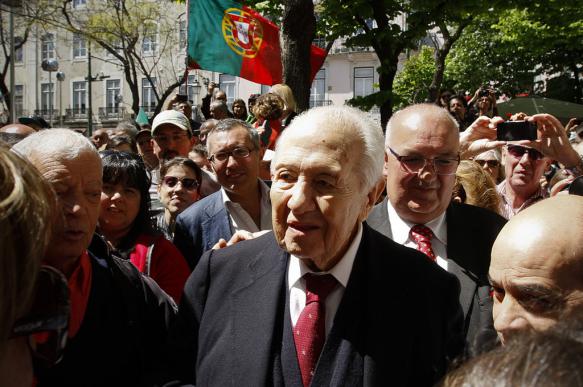Mário Soares dies: Portugal announces three days of mourning
Mário Soares, ex-Prime Minister and President of Portugal, a major figure in the fight for transition from the Estado Novo, or New State, regime to full parliamentary democracy, has died in Lisbon aged ninety-two. He had been on a life-support machine since mid-December.

Born in Lisbon in 1924, Mário Soares took two degrees at Lisbon University, Historical and Filosophical Sciences and then Law. As a lawyer he defended political prisoners, victims of the Estado Novo regime in Portugal, and among his clients were Álvaro Cunhal, historic leader of the Portuguese Communist Party and the family of the murdered candidate for the Presidency, Humberto Delgado who ran against Dr. Oliveira Salazar's Fascist regime.
Political career begins early
He began his political career at 19 years of age, joining MUNAF (Movement of National Anti-Fascist Unity), then at 22, entered the Central Committee of MUD (Movement of Democratic Unity). At 25 years of age, he was secretary of the Central Committee of the presidential candidacy of General Norton de Matos (against the regime candidate) and in 1958, was a member of the Committee supporting General Humberto Delgado, also running for the Presidency against the regime candidate.
From 1955, he moved away from the Portuguese Communist Party and founded Republican and Socialist Resistence in the same year and in 1961, co-authored the document Programme for the Democratization of the Republic. Arrested by the political police, PIDE, 12 times, he was exiled to the Isle of São Tomé in 1968 and was exiled in France in 1970.
Triumphant entry in Lisbon
Three days after the Revolution of April 25 1974 in Portugal, he returned from exile in Paris. He was Minister of Foreign Affairs from May 1974 to March 1975 and played an important part in the independence of Portugal's colonies (Angola, Cape Verde, Guinea-Bissau, Mozambique and São Tomé and Príncipe Isles in Africa and East Timor in Asia).
He was Prime Minister of the First Constitutional Government of Portugal 1976/1977.
In 1977 he committed himself to the cause for Portugal to join the European Economic Community, a process which culminated in the Adhesion Treaty in 1985, which Soares signed as Prime Minister. He was Prime Minister of the Second Constitutional Government (1978) and the Ninth Constitutional Government (1983-1985).
From 1986 to 1996 he was (twice) President of Portugal (1986-1991; 1991-1996). From 1995, he was President of the Independent World Commission on the Oceans and in 1997, President of the Promoting Committee of the World Water Contract. In the same year he was appointed President of the Portugal Africa Commission and President of the International European Movement. In 1999 he was elected to the European Parliament in the list of the Socialist Party. He lost the subsequent election for the Presidency of the European Parliament.
In 2005, at 81 years of age, he again ran for the Portuguese Presidency but unsuccessfully. In the last fifteen years, he worked for the Mário Soares Foundation, which he founded in 1991, in the Committee for Religious Freedom (President), the Jury for the Felix Houphouet-Boigny Prize of UNESCO (President) and as Patron of the International Ocean Institute (from 2009 until his death).
He died this afternoon, Saturday January 7 2017, at Hospital da Cruz Vermelha in Lisbon where he was interned from 13 December 12016 in a deep coma. In recent years he had been increasingly unwell, worsening after his wife, Maria Barroso, died in 2015.
Mário Soares was an anti-Communist and an anti-Fascist and understood that the base of his popularity was in the center, where he assumed a position of protagonism while following a discourse which struck the heart of the people, hence the term "Soares é fixe" (Soares is cool) during his presidential campaigns. His wife, Maria Barroso, could be seen almost daily taking his grandchildren across the road to the garden in Campo Grande, Lisboa, to feed the ducks while Mário Soares himself travelled around Lisbon on foot or sitting in the front seat of his car, beside the driver and without any bodyguards or police motorcycle outriders.
He may be called the father of Portugal's European Project and will remain a cornerstone of Portugal's recent history.
Timothy Bancroft-Hinchey
Pravda.Ru
Subscribe to Pravda.Ru Telegram channel, Facebook, RSS!


